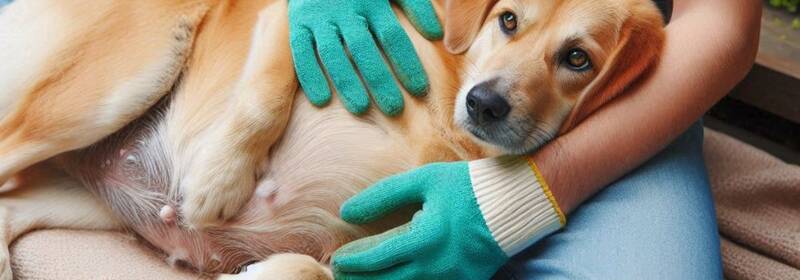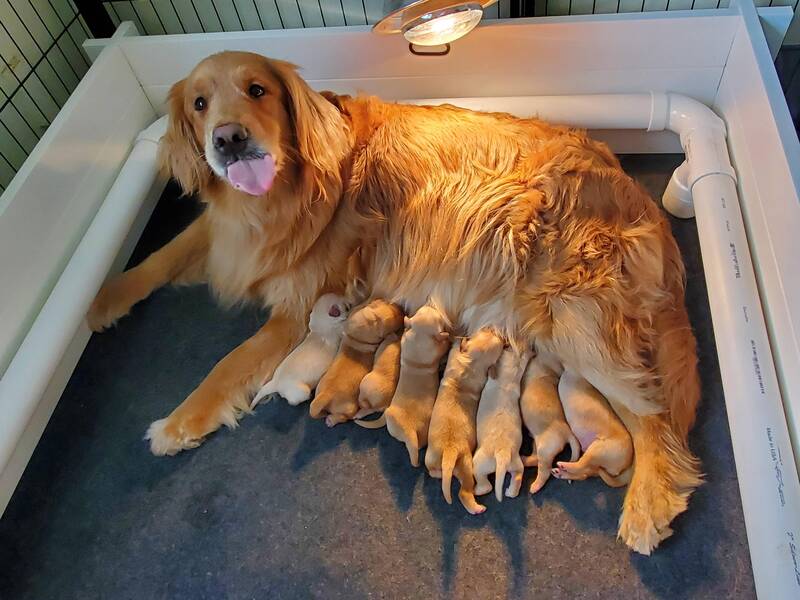Welcoming a litter of puppies to this world is one of the best feelings for pet parents. If this is your first time breeding your Goldie, the wait may feel eternal. Fortunately for us (and for our furry friends), their gestation period is much shorter than that of humans. But exactly how long are Golden Retrievers pregnant?
How Long Are Golden Retrievers Pregnant?

Golden Retrievers, like most dogs, have a relatively short pregnancy compared to humans. On average, a Golden Retriever’s pregnancy lasts about 63 days. However, it’s essential to note that this can vary slightly, typically ranging from 58 to 68 days.
Several factors can influence the length of a Golden Retriever’s pregnancy:
- Litter size: Larger litters may result in slightly shorter pregnancies.
- Mother’s age: Older Golden Retrievers might experience longer pregnancies.
- Genetics: Some bloodlines may tend towards shorter or longer gestation periods.
- Environmental factors: Stress levels and nutrition can impact pregnancy duration.
Understanding these factors can help you provide the best care for your pregnant Golden Retriever and prepare for the puppy’s arrival.
Stages of Golden Retriever Pregnancy

Let’s break down the journey of your Golden Retriever’s pregnancy into three main stages:
Early Stage (Weeks 1-3)
During the first three weeks, you might not notice many changes in your Golden Retriever. Here’s what’s happening behind the scenes:
- Week 1: Fertilized eggs travel to the uterine horns.
- Week 2: Eggs implant in the uterine lining. You might notice light spotting.
- Week 3: Embryos begin to form. Some dogs may experience “morning sickness.”
We have the option to pick up a test kit from the pharmacy, but the same can’t be said for your dogs. To make sure your Golden Retriever girl is pregnant, take her to the vet to perform diagnostic testing. If you know the exact date your dog was bred, you can ask your veterinarian to perform abdominal palpation after approximately 28 days. At this point, the puppies should feel like small golf balls inside their mother’s tummy.
It’s not advisable to try abdominal palpation at home, though, since this practice can harm the puppies if done wrongly.
Middle Stage (Weeks 4-6)
Changes become more noticeable during these weeks:
- Week 4: Embryos are about the size of walnuts. Your dog’s appetite may increase, and her nipples might become more prominent.
- Week 5: Puppies develop rapidly. You may notice a slight swelling in your dog’s belly.
- Week 6: Puppies now have recognizable features. A vet can often confirm pregnancy through palpation at this stage.
During this time, you should start increasing your dog’s food intake slightly. Consult with your vet about the best nutrition plan for your pregnant Golden Retriever.
Late Stage (Weeks 7-9)
The final weeks of pregnancy bring the most obvious changes:
- Week 7: Puppies are nearly fully formed. Your Golden Retriever’s belly will be noticeably larger.
- Week 8: Puppies get into position for birth. Your dog might start nesting behaviors.
- Week 9: It’s almost time! Your dog may become restless as she prepares for labor.
In these final weeks, ensure your Golden Retriever gets plenty of rest and gentle exercise. Keep a close eye on her and be prepared for the birth to happen any day.
Caring for Your Pregnant Golden Retriever

Proper Nutrition
Making sure your soon-to-be mom gets enough nutrients is the first task on our list. If she already has the best dog food for Golden Retriever and is at a healthy weight, changing her food is not necessary during the first stage of pregnancy. As she reaches the second stage, switches her food to a high-quality puppy food for Golden Retrievers or a pregnancy formula. Some of the high-quality food for pregnant Golden Retrievers comes from Hill, Royal Canin, and Purina.
Switching to a different diet doesn’t mean you have to increase the feeding portion since overeating and undereating are both dangerous for pregnant dogs. According to veterinarians, it’s best to increase food consumption slowly, until she consumes 35-50% more than usual. Feed your furry companion small meals frequently, as large ones may lead to digestive issues.
Exercise
Training sessions for your Golden Retrievers is still beneficial for her during pregnancy. However, we advise against strenuous activities—she still needs her energy for bearing and nurturing the pups! Instead, gentle and regular walks are enough to improve her endurance, preparing her for the birth. Aim for three to five quick strolls each day.
If possible, let your expectant mother exercise indoors during the final three weeks of pregnancy. This keeps her away from other dogs, lowering the risk of contracting the canine herpes virus and other infectious diseases.
Visits to the Vet
In fact, we would recommend taking your Golden Retriever for the vet as soon as you plan to breed her instead of waiting until pregnancy. To be a healthy mother, she should be properly vaccinated. Your vet will perform necessary checkups to see if any intestinal parasites or chronic conditions that might affect the puppies.
During pregnancy, scheduling regular vet visits is still crucial. They help you confirm the number of puppies and point out any health concerns your Goldie might have that could prevent her from having a normal whelped litter. From day 40th, take time to discuss with your vet whether to opt for a normal birth or cesarean.
Preparation for Puppies
Your dog’s breasts and nipples will significantly enlarge as the end of her pregnancy draws near. As the milk gland gets ready for pup rearing, you might even notice some milky fluid. As she walks, her big belly may wobble a little. That’s some of the signs your Golden Retriever is about to give birth.
We owners are preparing for the big day, too! Our job now is to set up a whelping box. This serves as a warm, secure, and hygienic place for your dog to give birth. You can purchase a whelping box or use a plastic swimming pool for the job. Make sure the mother can easily get in and out of the box, but not the puppies.
Place the box in a quiet area of the house and get your Goldie used to it. If you don’t familiarize her with the box in advance, she might choose other places to deliver, such as your closet.
Risks and Complications While Golden Retriever Pregnant

While most Golden Retriever pregnancies proceed smoothly, it’s important to be aware of potential risks and complications:
Common Health Issues
- Eclampsia (Milk Fever): A serious condition resulting from low blood calcium levels, typically occurring in the first few weeks after birth but sometimes during late pregnancy.
- Gestational diabetes: Dogs, like humans, can develop diabetes during pregnancy.
- Pyometra: A severe uterine infection that can occur after pregnancy, more common in older dogs or those with multiple litters.
Warning Signs to Watch For
Keep an eye out for these potential red flags:
- Prolonged vomiting or diarrhea
- Lethargy or weakness
- Vaginal bleeding or abnormal discharge
- Fever (normal temperature for dogs is 101-102.5°F or 38.3-39.2°C)
- Sudden weight loss
When to Seek Emergency Veterinary Care
Don’t hesitate to contact your vet if you notice:
- Prolonged labor (active labor for more than 24 hours without producing a puppy, or more than 2 hours between puppy deliveries)
- Signs of distress during labor (excessive panting, trembling, or crying out)
- Retained placenta (greenish-black discharge more than 24 hours after the last puppy is born)
- Failure to go into labor (more than 70 days without showing signs of labor)
Remember, it’s always better to err on the side of caution. Your veterinarian would rather hear from you and confirm everything is fine than miss a potentially serious complication.
The Bottom Line
Now you have a comprehensive understanding of Golden Retriever pregnancy, from its duration to the care required and potential complications to watch for. While the average pregnancy lasts about 63 days, each dog is unique, and variations are normal.
Breeding Golden Retrievers is an exciting but significant responsibility. By staying informed and providing attentive care, you can help ensure a healthy pregnancy and delivery for your furry friend. Always work closely with your veterinarian throughout the process, and don’t hesitate to ask questions or seek help when needed.

As a professional writer who specializes in canine care, I have spent a significant amount of time researching and writing about Golden Retrievers. While I do not own a Golden Retriever, my considerable research and collaboration with doctors, breeders, and Golden Retriever experts has provided me with a lot of information about this incredible breed. My writing covers a wide range of topics, from food and health concerns to behavior and training, to assist owners in raising well-rounded, healthy golden retrievers. Through this website, I wish to share my knowledge and positively touch the lives of both dogs and their humans.
